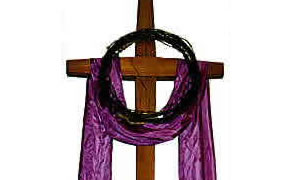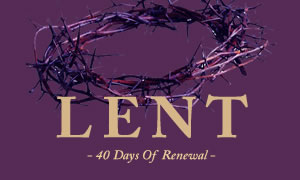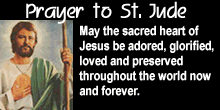


 Fasting and abstinence are closely related, but there are some differences in these spiritual practices. In general, fasting refers to restrictions on the quantity of the food we eat and on when we consume it, while abstinence refers to the avoidance of particular foods. The most common form of abstinence is the avoidance of meat, a spiritual practice that goes back to the earliest days of the Church.
Fasting and abstinence are closely related, but there are some differences in these spiritual practices. In general, fasting refers to restrictions on the quantity of the food we eat and on when we consume it, while abstinence refers to the avoidance of particular foods. The most common form of abstinence is the avoidance of meat, a spiritual practice that goes back to the earliest days of the Church.
Depriving Ourselves of Something Good:
Until the Second Vatican Council, Catholics were required to abstain from meat every Friday, as a form of penance in honour of the death of Jesus Christ on the Cross on Good Friday. Since Catholics are normally allowed to eat meat, this prohibition is very different from the dietary laws of the Old Testament or of other religions (such as Islam) today.
In the Acts of the Apostles (Acts 10:9-16), St. Peter has a vision in which God reveals that Christians can eat any food. So, when we abstain, it's not because the food is impure; we're voluntarily giving up something good, for our spiritual benefit.
Current Church Law Regarding Abstinence:
That's why, under current Church law, the days of abstinence fall during Lent, the season of spiritual preparation for Easter. On Ash Wednesday and all of the Fridays of Lent, Catholics over the age of 14 are required to abstain from meat and from foods made with meat.
Many Catholics don't realize that Church still recommends abstinence on all Fridays of the year, not just during Lent. In fact, if we don't abstain from meat on non-Lenten Fridays, we're required to substitute some other form of penance.
Going Beyond What's Required:
If you would like to make abstinence a bigger part of your spiritual discipline, a good place to start is to abstain from meat on all Fridays of the year. During Lent, you might consider following the traditional rules for Lenten abstinence, which include eating meat at only one meal per day (in addition to strict abstinence on Ash Wednesday and Fridays).
Unlike fasting, abstinence is less likely to be harmful if taken to extremes, but, if you want to extend your discipline beyond what the Church currently prescribes (or beyond what it has prescribed in the past), you should consult your priest.
What Are the Rules for Fasting and Abstinence in the Catholic Church?
Fasting and abstinence are spiritual practices that are vital to the Christian life. What are the rules for fasting and abstinence in the Catholic Church?
The rules for fasting and abstinence in the Catholic Church are set forth in the Code of Canon Law (for the Roman Catholic Church) and in the Code of Canons of Oriental Churches (for the Eastern Catholic Churches). To a limited extent, they can be modified by the conference of bishops for each particular country (or, in the Eastern Churches, for each particular rite).
The Code of Canon Law prescribes (Canons 1250-1252):
Can. 1250: The penitential days and times in the universal Church are every Friday of the whole year and the season of Lent.
Can. 1251: Abstinence from meat, or from some other food as determined by the Episcopal Conference, is to be observed on all Fridays, unless a solemnity should fall on a Friday. Abstinence and fasting are to be observed on Ash Wednesday and Good Friday.
Can. 1252: The law of abstinence binds those who have completed their fourteenth year. The law of fasting binds those who have attained their majority, until the beginning of their sixtieth year. Pastors of souls and parents are to ensure that even those who by reason of their age are not bound by the law of fasting and abstinence, are taught the true meaning of penance.
In the United States, the U.S. Conference of Catholic Bishops has declared that "the age of fasting is from the completion of the eighteenth year to the beginning of the sixtieth." The USCCB also allows the substitution of some other form of penance for abstinence on all of the Fridays of the year, except for those Fridays in Lent. Thus, the rules for fasting and abstinence in the United States are:
Every person 14 years of age or older must abstain from meat (and items made with meat) on Ash Wednesday, Good Friday, and all the Fridays of Lent.
Every person between the age of 18 and 60 must fast on Ash Wednesday and Good Friday.
Every person 14 years of age or older must abstain from meat (and items made with meat) on all other Fridays of the year, unless he or she substitutes some other form of penance for abstinence.
If you are outside the United States, you should check with the bishops' conference for your country.
For the Eastern Catholic Churches, the Code of Canons of Oriental Churches prescribes (Canon 882):
Can. 882: On the days of penance the Christian faithful are obliged to observe fast or abstinence in the manner established by the particular law of their Church sui iuris.
Thus, Eastern Catholics should check with the governing body for their particular rite.


I have been thinking a great deal about my experience at Reconciliation this past Saturday. I felt an intense and unexplainable urge to go and confess my sins when I woke up that morning. I try to go every six weeks or so, but this was no routine visit to the priest for me. I needed to unburden myself of the numerous venial sins I had committed since I last participated in this Sacrament.
Purest Gold: God's Refining Fire in our Lives »
After salvation, many young Christians wonder if there's anything more to their newfound faith than just the security blanket of "being a Christian." Time and time again, God shows himself as a "refiner," and our lives are as gold. God started leading me in this study to understand what He was doing in my life, as well as in the lives of others.
Picking up my pen to write this column, I couldn’t imagine how time flies. Since the last publication of this column I have gone through a lot, especially the loss of my dear mother to whom I dedicate this article. Not only her, but seems I lost a whole generation of my close family.
How to Achieve Business Excellence »
“Do you see a man who excels in his work? He will stand before Kings; He will not stand before unknown men.” Proverbs 22:29
Spiritual Development for our Youth »
Most of us youth in today's fast moving world are easily thrown off by difficulties and worries.
The theme of conversion is a thread that runs all through Lent, but conversion takes on different aspects throughout the phases of Lent. The first two and a half weeks focused on the interior turning of hearts; the liturgy urges the faithful to reflect and examine consciences thoroughly.
Saint Josephine Bakhita »
Feast Day: February 8
Patron Saint Of: Sudan
Saint Josephine Margaret Bakhita was born around 1869 in the village of Olgossa in the Darfur region of Sudan. She was a member of the Daju people and her uncle was a tribal chief. Due to her family lineage, she grew up happy and relatively prosperous, saying that as a child, she did not know suffering.
Catholics Must Fast More Intensely This Lent»
The Norbertine Canons of St. Michael's Abbey have created this digital Lenten retreat so that you can journey through this holy season alongside them. If you want to have one of your best Lenten seasons yet, join us in our Lenten Program "The Great Fast" - https://theabbotscircle.com/the-great-fast-join
When Your Faith Is Put to the Test - Bishop Barron's Sunday Sermon»
Friends, we come now to the Second Sunday of Lent, and we’re on both dangerous and very holy ground with the first reading from the twenty-second chapter of Genesis. The ancient Israelites referred to it as the “Akedah,” which means the “binding”: Abraham binds and is ready to sacrifice Isaac at God’s command.

Copyright © 2002-2024 THE BEACON INTERNATIONAL CATHOLIC MAGAZINE. All rights reserved.
another mc.rufus interactive web design